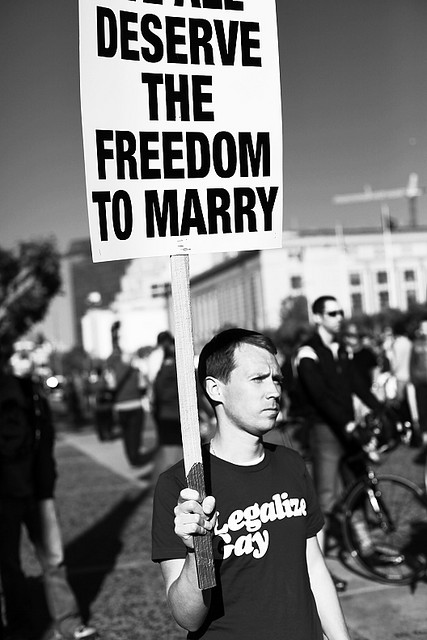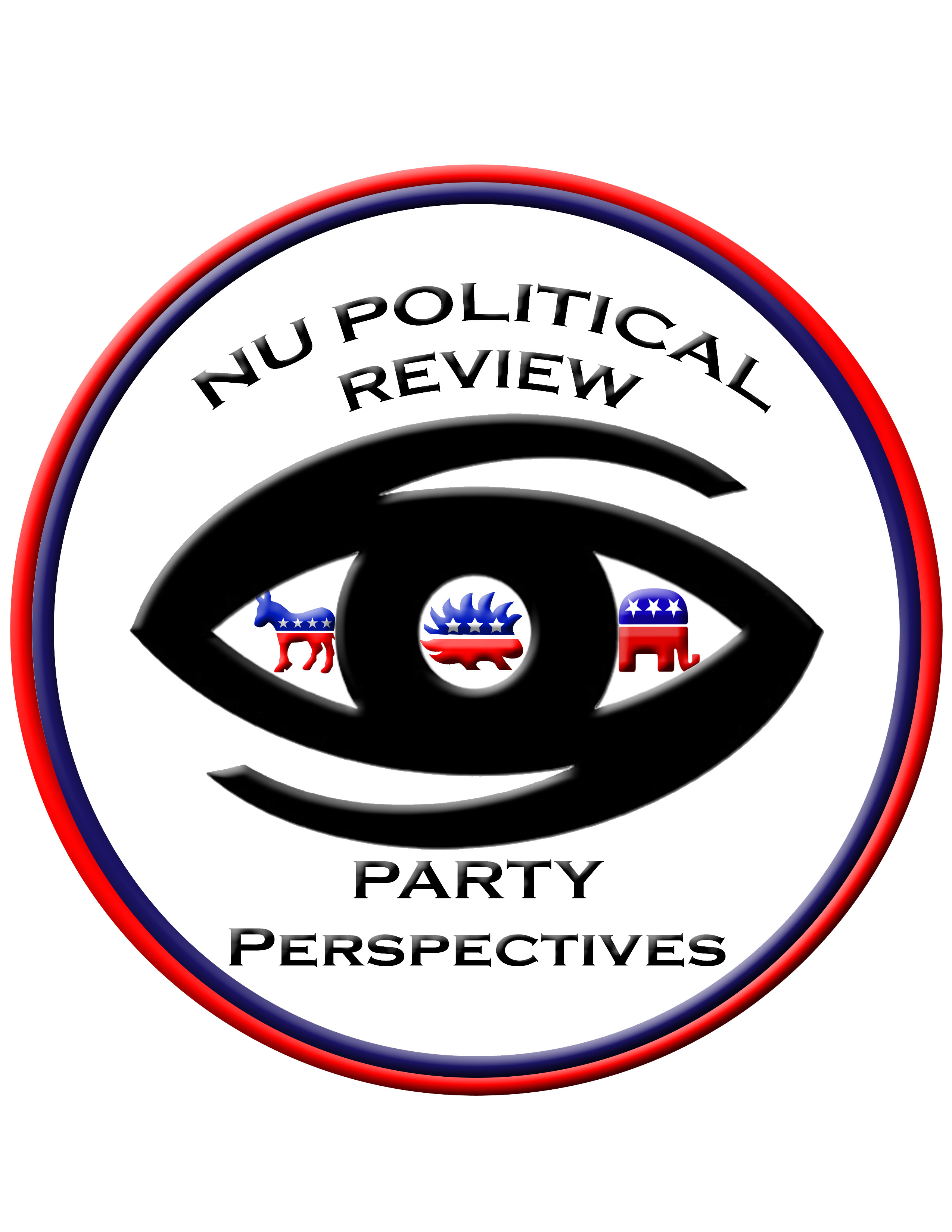In a letter to the Speaker of the House, President Obama and Attorney General Eric Holder signaled that the White House would no longer defend the constitutionality of the Defense of Marriage Act. In doing so the president took a proactive step for the equal rights of gay men and women across this country. This move is a largely symbolic, as the Speaker of the House of Representatives, John Boehner (R-Oh), has already assured that the House general counsel will argue in favor of the law in court. Still, the Obama Administration’s action brings forth an important question, is the Defense of Marriage Act constitutional?
Clearly the issue of gay marriage itself is a contentious one where differing opinions are rarely able to find common ground. However, as the Defense of Marriage Act has shown over the last decade, there are legal and constitutional pitfalls for legislating against gay marriage. Of all provisions within the Defense of Marriage Act (DOMA), section 3 is the most controversial, as well as the one the Obama is specifically not defending. Section 3 claims, “In determining the meaning of any Act of Congress, or of any ruling, regulation, or interpretation of the various administrative bureaus and agencies of the United States, the word ‘marriage’ means only a legal union between one man and one woman as husband and wife, and the word ’spouse’ refers only to a person of the opposite sex who is a husband or a wife.”[i] This portion prevents federal statutes from applying to gay couples and also creates the basis for claims that the law is unconstitutional.
DOMA creates two separate federal classifications of marriage within states that allow gay marriages. According to the General Accounting Office, there are 1,138 federal provisions which provide benefits, rights, and privileges on the basis of marriage. A few examples of these provisions are estate tax exemptions, social security survivor benefits, and federal employer provided health coverage for an employee’s spouse.[ii] Even if a state recognizes the legal status of same-sex marriages, these benefits are withheld from those marriages under the Defense of Marriage Act. Such separate classifications create discrimination within the federal tax code that come into conflict with the equal protection clause of the 14th amendment. This clause states, “No state shall make or enforce any law which shall abridge the privileges or immunities of citizens of the United States… nor deny to any person within its jurisdiction the equal protection of the laws.”[iii] DOMA denies same-sex couples equal protection in the economic realm.
An example of the inequality suffered by same-sex couples under DOMA is in gifting money or property to a spouse. Normally, gifts between spouses are non-taxable events, including in cases of inheritance. As couples who are not federally recognized as married, a gay couple’s interspousal money transfers are taxed in the same manner as a loan or gift between un-married individuals. [iv] This same issue is common in cases of estate transfers from the deceased spouse to their survivor. Even with extremely large estates totaling in the billion dollar range, there is no estate tax incurred on a hetero-sexual spouse. However, an estate passed to a surviving spouse in a gay marriage is subject to taxation. This brings up a clear fault in the law when subjected to constitutional scrutiny. Given two different married couples, a straight one and a gay one, with the exact same financial records, passing the exact same amounts down to their surviving spouse, only one will be subjected to taxation. Such inequality in taxation brings some question to the nature of equal protection under the law for the same-sex couple.
Social security spousal survivor benefits show another fault in DOMA, again on the basis of equality under the law. In a heterosexual marriage, a widowed spouse is able to get 100% of their deceased spouse’s benefits. However, the Social Security Administration only provides this benefit toward couples under the federal definition of marriage, thus in the case of same-sex marriage there is no entitlement to such survivor benefits.[v] This problem played a role in the Massachusetts district court case of Gill v. Office of Personnel Management (OPM), as partial reasoning for the lawsuit by three of the plaintiffs. One plaintiff, Herb Burtis, was forced to forego about $700 in monthly benefits that he would be entitled to had his marriage been federally recognized.[vi] Inability to access funds that a widowed spouse is entitled to places an unequal and undue burden on gay families.
The Federal Employee Health Benefit Program (FEHB) normally provides for both a federal employee and their spouse. As with other programs, the FEHB does not provide that same spousal coverage to federal employees married to someone of the same sex. Having the option of joining onto a spouse’s federal insurance policy would force the uninsured spouse to seek either a job which provides health insurance or a private insurance policy. A piece in the New York Times estimates that over a thirty year period under these circumstances, a gay family will pay almost $21,200 more for health insurance than a heterosexual family with the same financial standing. [vii] This added cost arises from the fact that the homosexual spouse is not able to receive the same federal health insurance benefit as a heterosexual one. Yet again, it is a case of the federal government discriminating against the gay family through a means of economic exclusion.
The Defense of Marriage Act’s third section is unconstitutional by the measure of the equal protection clause, which is the basis for the Department of Justice’s recent decision to discontinue defense of the law in the courts. While the White House cannot discontinue the federal government’s enforcement of the law, it does reserve the right to decide which laws it will defend in the judicial system. Currently there are three separate cases that are challenging the constitutionality of DOMA: Pedersen v. OPM in Connecticut, Windsor v. United States in New York, and Gill v. OPM in Massachusetts. That is not to say that these cases will go without a governmentally provided defense, as the House of Representatives, after the bipartisan legal advisory group (consisting of Republicans Eric Cantor, John Boehner, and Kevin McCarthy and Democrats Nancy Pelosi and Steny Hoyer) voted 3-2 in favor of defending the case.[viii]
While it will have no effect on the Defense of Marriage Act as it currently stands, the Obama administration’s move shows a profound view of constitutional equality. Current legal practices provide for federally mandated discrimination against same-sex couples whose marriage is respected by their state, but not by their nation. Through DOMA, the United States Government creates two separate classes of marriage, putting the same-sex class at an undue disadvantage. The Defense of Marriage Act creates a governmental bias against gay couples in the guise of “protecting marriage,” when it is really creating an unequal environment for gay men and women trying to gain legal recognition of their love for a partner.
[i] “Defense of Marriage Act”. United States Government Printing Office. 1996-09-21. http://frwebgate.access.gpo.gov/cgi-bin/getdoc.cgi?dbname=104_cong_public_laws&docid=f:publ199.104. Retrieved 2011-3-12
[ii] U.S. General Accounting Office. Defense of Marriage Act: Update to Prior Report, GAO-04-353R. Washington, DC: General Accounting Office, 2004. http://www.gao.gov (accessed March 12, 2011).
[iii] United States of America. US Constitution. http://topics.law.cornell.edu/constitution/amendmentxiv.
[iv] Black, Stephen T. “Same-Sex Marriage and Taxes.” BYU Journal of Public Law 22, no. 2 (Winter 2008): 327-57. http://www.law2.byu.edu/jpl/Vol22.2/Black.pdf.
[v] United States of America. Congressional Research Service. Domestic Social Policy Division. The Effect of State-Legalized Same-Sex Marriage on Social Security Benefits and Pensions. By Laura Haltzel and Patrick Purcell. July 28, 2004. http://www.glad.org/uploads/docs/cases/gill-v-office-of-personnel-management/7-2004-social-security.pdf.
[vi] Reuters. “Fed Benefits Gap Draws LGBT Ire.” February 10, 2011. http://blogs.reuters.com/prism-money/2011/02/10/fed-benefits-gap-draws-lbgt-ire/.
[vii] Lieber, Ron, and Tara Siegel-Bernard. “The High Price of Being a Gay Couple.” The New York Times, October 2, 2009. http://www.nytimes.com/2009/10/03/your-money/03money.html?_r=3&pagewanted=1.
[viii] Hooper, Molly K. “House Leaders Vote to Intervene in DOMA Defense.” The Hill, March 09, 2011. http://thehill.com/blogs/blog-briefing-room/news/148521-house-leaders-vote-to-intervene-in-doma-defense.



